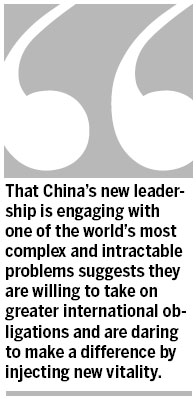A more balanced approach
Updated: 2013-05-09 08:07
By He Wenping (China Daily)
|
||||||||

Xi's four-point proposal on Palestinian question demonstrates Beijing's willingness to play a positive role in promoting peace
China is hosting both the Palestinian and Israeli leaders this week as part of its Middle East diplomacy. President Xi Jinping welcomed his Palestinian counterpart, Mahmoud Abbas in Beijing on Monday, as Israeli Prime Minister Benjamin Netanyahu arrived in Shanghai, the first stop of a five-day visit, which brought him to Beijing on Wednesday.
It is unprecedented to see the leaders of Palestine and Israel visiting China at the same time, and Western media outlets were quick to suggest that China is going to play a greater role in Middle East affairs in order to expand its influence in the region.
While the international community seems to be concerned about the way China is giving full play to its strengths in seeking to facilitate the Palestinian-Israeli peace talks, it is a positive move for China to take a more active role in Middle East affairs.
Since the outbreak of the First Arab-Israeli War in 1948, bloody confrontations and conflicts between Israel and Arab countries have undermined peace and stability in the Middle East. Though the then government of Israel and the Palestine Liberation Organization reached a consensus on the principle of land for peace in the 1993 Oslo Accords, the peace process has failed to move forward because of various internal and external obstructions and has finally stalled.
The United States has long been the most influential external force in the Middle East. Since President Jimmy Carter successfully promoted the signing of Camp David Accords in the 1970s, each US president has attempted to promote the Israeli-Palestinian peace process. However, Washington's diplomatic efforts have remained fruitless due to its long-term partiality to Israel.
Unlike the US, China has long held a neutral and balanced stance, and it has managed to build friendly relations with both the Palestinians and the Israelis. The nearly simultaneous visits to China by leaders of Palestine and Israel signaled the two countries' desire and expectations that China play a greater role in promoting the Middle East peace process. Thanks to its strong relations with both sides, China can make positive and constructive efforts to help restart peace talks between Palestine and Israel.
During his talks with Abbas, Xi presented a four-point proposal for the settlement of the Palestinian question. The proposal reaffirms China's support for an independent Palestine based on the 1967 borders, encourages the two sides to create the necessary conditions for the resumption of peace talks and build on the existing achievements that include the principle of land for peace, and recommends the international community take an objective and fair position and make vigorous efforts to encourage peace talks. Xi's proposal demonstrates Beijing's willingness to play a more positive and constructive role in promoting Palestinian-Israeli peace talks.
China cannot magically remove all the obstacles in the way of peace talks, but by virtue of its good relations with both Palestine and Israel and its contacts with other important regional forces, such as Hamas, Hezbollah and Iran - which Washington refuses to work with - China can facilitate and inject new vitality into the peace process.
In addition, promoting the peace process through the economic integration of Palestine and Israel is a viable approach, and China can increase investment and economic cooperation with the two countries.
That China's new leadership is engaging with one of the world's most complex and intractable problems suggests they are willing to take on greater international obligations and are daring to make a difference by injecting new vitality into the Israeli-Palestinian peace talks. With the Obama administration initiating a new round of strategic input over the past two months, China and the US should work together to ensure they are on the same track.
The year 2013 marks the 20th anniversary of the signing of the Oslo Accords. The Palestinian-Israeli conflict must not cost the dreams and lives of another generation.
The author is a senior fellow with the Chahar Institute and a researcher with the Institute of West Asian and African Studies at the Chinese Academy of Social Sciences.

 Michelle lays roses at site along Berlin Wall
Michelle lays roses at site along Berlin Wall
 Historic space lecture in Tiangong-1 commences
Historic space lecture in Tiangong-1 commences
 'Sopranos' Star James Gandolfini dead at 51
'Sopranos' Star James Gandolfini dead at 51
 UN: Number of refugees hits 18-year high
UN: Number of refugees hits 18-year high
 Slide: Jet exercises from aircraft carrier
Slide: Jet exercises from aircraft carrier
 Talks establish fishery hotline
Talks establish fishery hotline
 Foreign buyers eye Chinese drones
Foreign buyers eye Chinese drones
 UN chief hails China's peacekeepers
UN chief hails China's peacekeepers
Most Viewed
Editor's Picks

|

|

|

|

|

|
Today's Top News
Shenzhou X astronaut gives lecture today
US told to reassess duties on Chinese paper
Chinese seek greater share of satellite market
Russia rejects Obama's nuke cut proposal
US immigration bill sees Senate breakthrough
Brazilian cities revoke fare hikes
Moody's warns on China's local govt debt
Air quality in major cities drops in May
US Weekly

|

|







